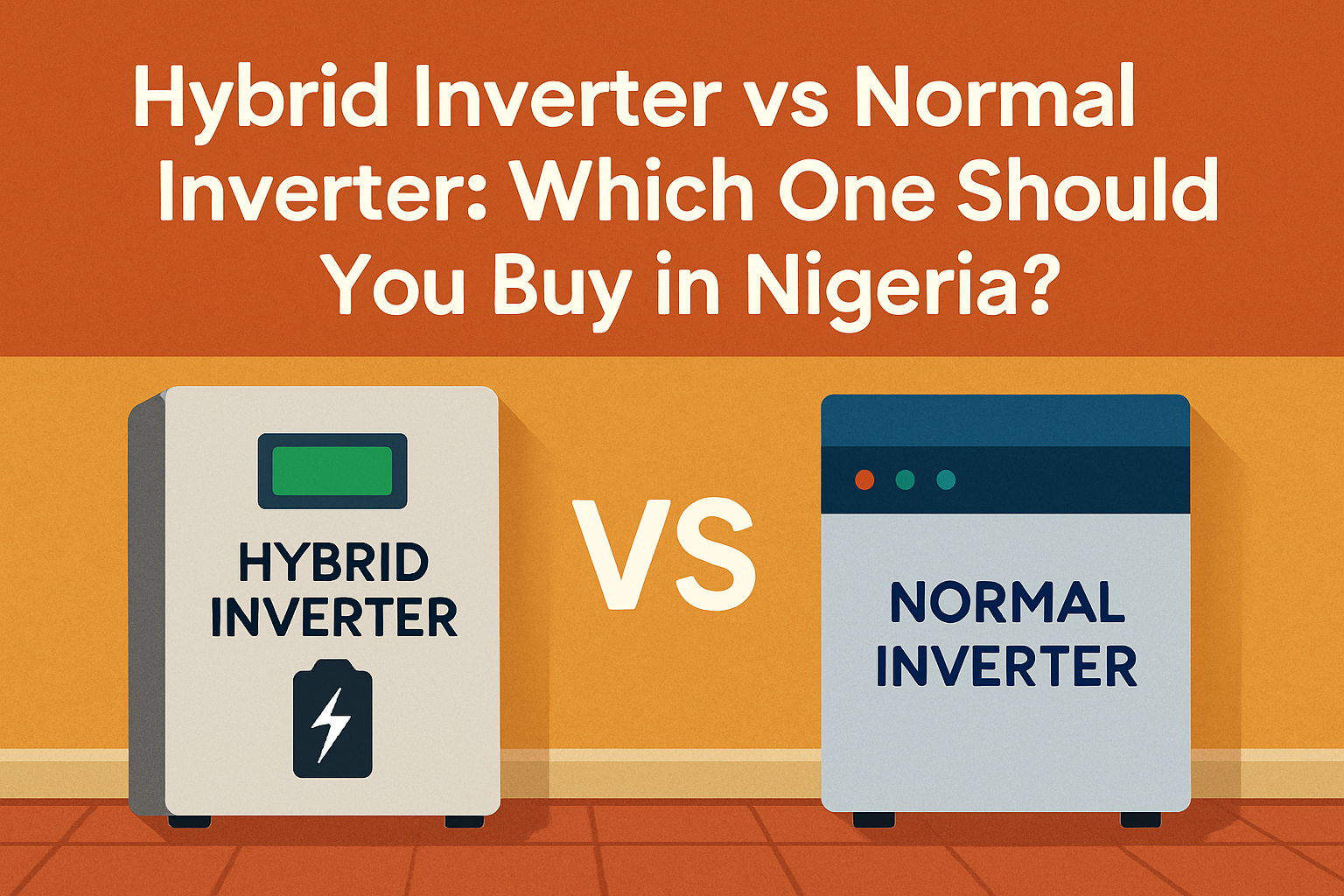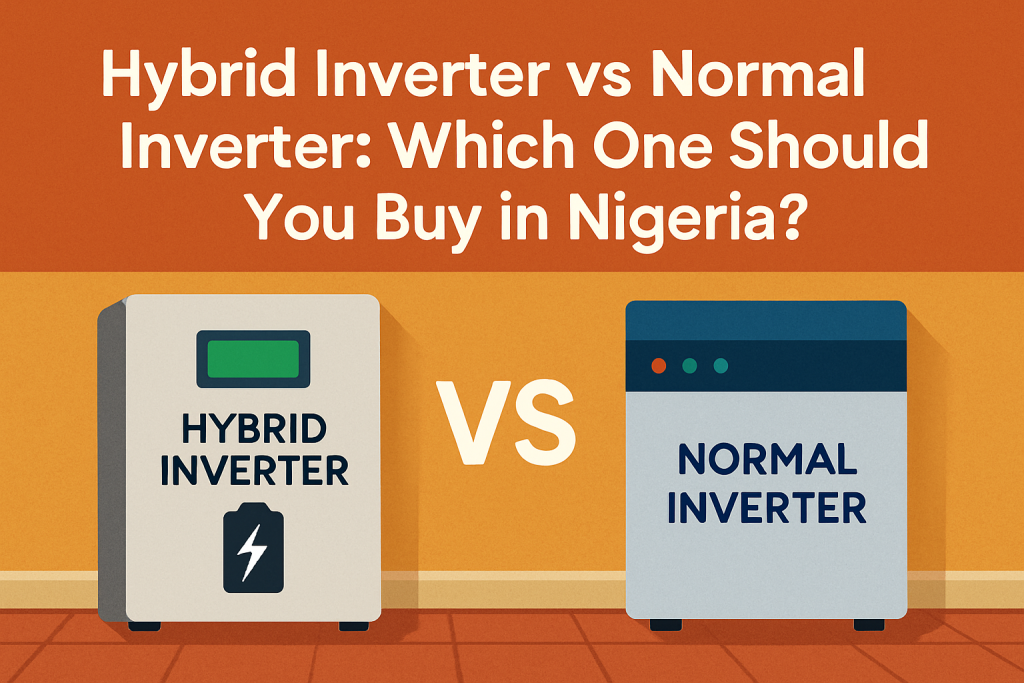
Hybrid Inverter vs Normal Inverter: Which One Should You Buy in Nigeria?

Are you confused about whether to choose a hybrid inverter, normal inverter, or solar inverter for your power needs? With so many options available, it’s essential to understand the differences, advantages, and disadvantages of hybrid inverters before making a decision.
When it comes to choosing the right inverter for your home or business in Nigeria, the options can be overwhelming. Should you go for a hybrid inverter, a normal inverter, or even a solar inverter? And what’s the difference anyway?
In this guide, we’ll break down the key differences, compare prices, highlight the pros and cons, and help you decide which inverter suits your needs best—whether you’re powering a small apartment in Lagos or a full office setup in Abuja. We’ll compare hybrid inverters vs normal inverters, discuss their prices, and help you determine which one is best for your home or business.
Hybrid Inverter vs Normal Inverter: Key Differences
1. What is a Normal Inverter?
A normal inverter (also called a standard or off-grid inverter) converts DC power from batteries into AC power for your appliances. It does not interact with solar panels or the grid—its primary function is backup power during outages.
2. What is a Hybrid Inverter?
A hybrid inverter combines the functions of a normal inverter and a solar inverter. It can:
- Basically have Inbuilt SOLAR CHARGE CONTROLLER
- hybrid inverter is a smart device that combines solar power, grid electricity, and battery storage into one seamless system. It can:
- Charge batteries using solar panels or NEPA (PHCN)
- Supply power directly to your appliances
- Automatically switch between power sources depending on availability
Think of it as the “all-in-one” solution for Nigerian homes dealing with erratic power supply.
What Is a Normal Inverter?
A normal inverter (also called a conventional or off-grid inverter) simply converts DC power from batteries into AC power for your appliances. It typically:
- Do not have Inbuilt SOLAR CHARGE CONTROLLER
- Charges batteries using only grid electricity
- Does not support solar panels unless paired with a separate charge controller
What About Solar Inverters?
Solar inverters are designed specifically to convert DC power from solar panels into usable AC power. They’re ideal for homes that rely heavily on solar energy. However, they may not support grid charging unless they’re hybrid models.
Hybrid Inverter vs Normal Inverter vs Solar Inverter
| Feature | Hybrid Inverter | Normal Inverter | Solar Inverter |
|---|---|---|---|
| SOLAR CHARGE CONTROLLER | Inbuilt | External | Inbuilt |
| Battery Required | Optional (some models) | Required | Optional |
| Solar Panel Compatibility | Built-in | Needs external controller | Built-in |
| Automation & Switching | Smart & automatic | Manual or semi-automatic | Automatic |
| Ideal For | Homes & businesses with solar + grid | Homes with grid-only backup | Solar-powered homes |
| Price Range in Nigeria | ₦250,000 – ₦800,000+ | ₦150,000 – ₦400,000 | ₦200,000 – ₦600,000 |
Hybrid Inverter Price in Nigeria (As At 2025)
Prices vary depending on brand, capacity, and features. Here’s a rough guide:
- 3.5kVA Hybrid Inverter – ₦250,000 to ₦350,000
- 5kVA Hybrid Inverter – ₦350,000 to ₦600,000
- 10kVA Hybrid Inverter – ₦600,000 to ₦850,000+
At Powersolutionmall.com, we offer competitive prices and expert installation across Nigeria. You can browse our hybrid inverter collection for the latest deals.
Hybrid Inverter vs Normal Inverter vs Solar Inverter
| Feature | Hybrid Inverter | Normal Inverter | Solar Inverter |
|---|---|---|---|
| Works with Solar Panels (Directly) | ✅ Yes | ❌ No | ✅ Yes |
| Battery Backup | ✅ Yes | ✅ Yes | ❌ No (unless hybrid) |
| Grid Interaction | ✅ Yes (if grid-tied) | ❌ No | ✅ Yes (if grid-tied) |
| Energy Efficiency | ⭐⭐⭐⭐⭐ (Uses solar first) | ⭐⭐ (Only battery power) | ⭐⭐⭐ (Solar only) |
| Cost | 💰💰💰 Higher | 💰 Lower | 💰💰 Medium |
Disadvantages of Hybrid Inverters
While hybrid inverters offer flexibility, they’re not perfect. Here are some drawbacks:
- Higher Cost: They’re more expensive than normal inverters.
- Complex Installation: Requires professional setup, especially with solar integration.
- Battery Compatibility: Some models may not work with all battery types.
- Maintenance – More components mean more potential issues.
Hybrid vs Off-Grid Inverter
Off-grid inverters operate independently of the utility grid, relying solely on solar panels and batteries for power. Hybrid inverters, on the other hand, are grid-tied and can utilize solar power while still being connected to the grid, and they also have battery storage capabilities. Hybrid inverters can work with both grid and solar. If you live in a rural area with no NEPA, an off-grid inverter might be better. But for urban areas like Lagos, hybrid is king.
📦 Popular Hybrid Solar Inverter Brands in Nigeria
- Luminous
- Mercury
- Growatt
- Sukam
- Bluegate
These brands offer reliable performance and are widely available at https://powersolutionmall.com/product-category/inverter/
Frequently Asked Questions (FAQ)
Which inverter is better, hybrid or normal?
For most Nigerians, a hybrid inverter is better because it supports both solar and grid power. It gives you flexibility and helps reduce reliance on NEPA.
What are the disadvantages of a hybrid inverter?
Hybrid inverters are more expensive and require professional installation. They may also need compatible batteries and regular maintenance.
Which type of inverter is the best?
The best inverter depends on your location and power needs. Hybrid inverters are ideal for urban homes with access to both solar and grid. Off-grid inverters are better for remote areas.
Can I use a hybrid inverter without a battery?
Yes, some hybrid inverters can work without batteries by supplying power directly from solar panels or the grid. But for backup during outages, batteries are recommended.
🛒 Ready to Buy? Visit Powersolutionmall.com to explore our wide range of hybrid, normal, and solar inverters. We deliver nationwide and offer expert installation services.


